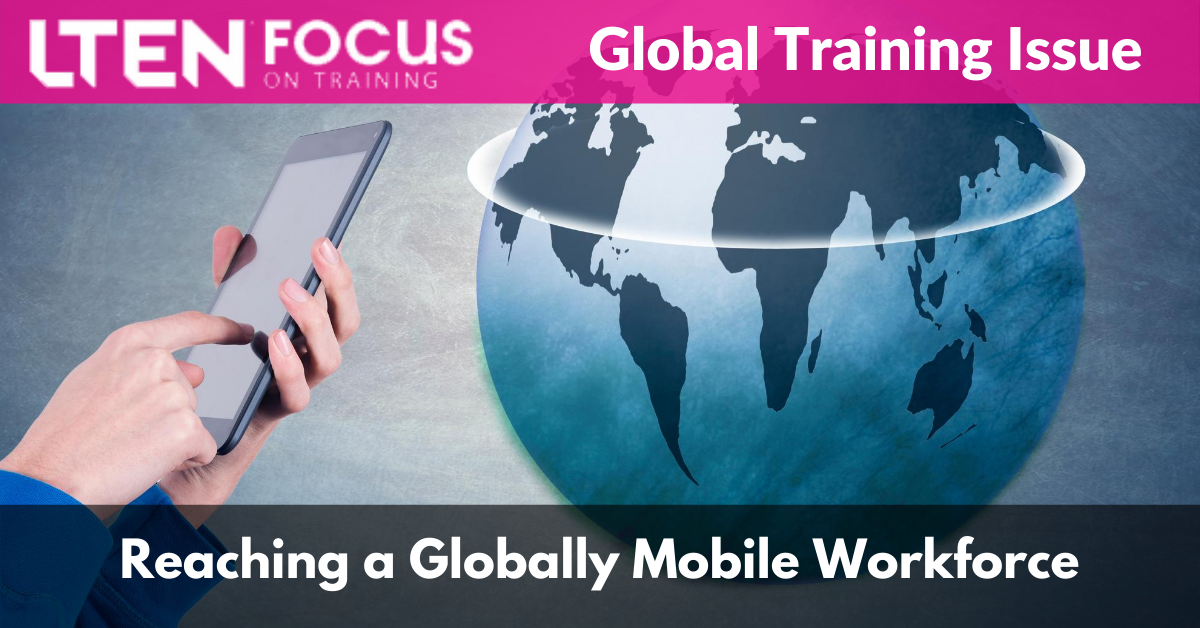
Reaching a Globally Mobile Workforce
FEATURE STORY – By John Constantine, Theodore (Ted) Riley and Kapil Kalra
The typical load of compliance training is a productivity burden on employees.
There are many challenges in training a geographically spread workforce. Among them are:
- Bridging the tech gap between personal life and work life for employees.
- Creating effective, small-package (microlearning) modules that effectively train employees.
- Cutting through the communications clutter bombarding employees.
- Reaching a globally mobile and remote workforce.
This article is a case study on how one company did all of these with one mobile device-based app.
At the beginning of 2019 it became apparent that the recent explosive growth of the company (it went from less than 200 employees to more than 1,200 in three years) created a need to re-think how employees were trained and communicated key messages that affected performance.
The objectives of this initiative came from some business problems that are common to many companies moving from startup to larger-company mode:
 The typical corporate IT solutions exposed a glaring gap between how employees behave at work versus how they behave in their personal lives. This workforce is a younger, tech-savvy, Silicon Valley group. In their personal lives, they live on the Internet and are able to find answers and solutions to everyday problems with ease. At work, the limitations of corporate IT solutions caused an inability to find information easily, instead relying on email, share drives and other substandard methods of getting the information they need on a daily basis. In addition, it just did not sit well with this audience that the technology at work was, in the words of multiple interviewed employees, “lame.”
The typical corporate IT solutions exposed a glaring gap between how employees behave at work versus how they behave in their personal lives. This workforce is a younger, tech-savvy, Silicon Valley group. In their personal lives, they live on the Internet and are able to find answers and solutions to everyday problems with ease. At work, the limitations of corporate IT solutions caused an inability to find information easily, instead relying on email, share drives and other substandard methods of getting the information they need on a daily basis. In addition, it just did not sit well with this audience that the technology at work was, in the words of multiple interviewed employees, “lame.”- As a clinical organization, much of their activity is governed by the need for regulatory compliance and adherence to GcP principles of managing clinical trials. This requires a lot of mandatory training, which can be overwhelming if not staged correctly. The typical load of compliance training is a productivity burden on employees. There was a clear need to streamline this required training and reduce time overhead while maintaining compliance.
- Communications from various groups to individual employees were also becoming a burden. Hundreds of emails from different directions constantly bombarded their inboxes. Share drives, websites, etc., added to the burden. There was a need to cut through the noise with messages that were important, so employees did not have to decide for themselves what was most important.
- This workforce was almost entirely remote and mobile. There were hundreds of staff that were located in various parts of the United States, and a European office that posed a particular problem: a 9-hour time zone difference from the U.S. West Coast headquarters. Also, even the HQ staff was considered remote, due to the Bay Area practices of alternate hours and commuting difficulties.
There is a clear need to streamline required training and reduce time overhead while maintaining compliance.
The Results
 To date, the app has been used by 180 clinical staff in multiple countries with more than 5,000 interactions in a few short months. It has been used for functional training, followup to in-person training, compliance training and biweekly communication messages from management. The format is mobile, on any device any time, and generally in a microlearning format (all bite-sized, less than five minutes per module). It has been flexible as well, with multiple formats including SCORM packages, videos, audio, documents and PowerPoint.
To date, the app has been used by 180 clinical staff in multiple countries with more than 5,000 interactions in a few short months. It has been used for functional training, followup to in-person training, compliance training and biweekly communication messages from management. The format is mobile, on any device any time, and generally in a microlearning format (all bite-sized, less than five minutes per module). It has been flexible as well, with multiple formats including SCORM packages, videos, audio, documents and PowerPoint.
Feedback has been very good as well, and even during a merger with a larger company resulting in increased turnover, the engagement rate has been high.
John Constantine is senior vice president, talent solutions, for Orchestrall. Theodore (Ted) Riley is the director of training at Lonza Group AG. Kapil Kalra is chief customer officer (CCO) and co-founder of ACTO. Email the authors through john.constantine@orchestrallinc.com.
Summer 2020









